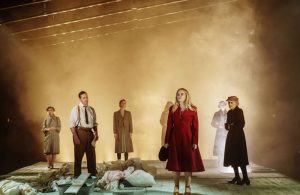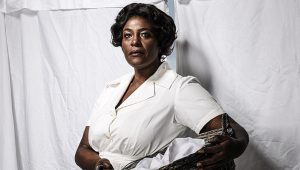Click here to see 5 Plays That Shocked British Theatre on YouTube
Ever since they were first built in the 1500s right up to today, British theatres have been running into trouble with what they put on their stages but five plays in particular- one in each of the last five centuries- shocked British theatre to the core.
The first British theatre buildings staged some of the greatest plays ever written in the English language. The so-called English renaissance ran from the late 1500s through to the mid 1600s. Theatre was the television of its day- the leading form of popular entertainment. The top playwrights of this golden era included William Shakespeare and Christopher Marlowe. But what was allowed on stage was strictly controlled. For example, no modern monarchs could be portrayed. One playwright decided to test the boundaries.
The Game At Chess

Thomas Middleton was, along with Ben Jonson and John Fletcher, one of the big three playwrights of the early 17th century. His hit plays included The Revenger’s Tragedy and The Changeling. So there was much anticipation when A Game At Chess was staged in August 1624 by the acting company and playhouse most associated with William Shakespeare- the King’s Men at the Globe Theatre.
On the face of it, it was a comedy was about the pieces in a chess match but audiences immediately latched on to the fact that the play is an allegory for the relationship between Spain and Great Britain. The White King was James I of England and the Black King Philip IV of Spain.
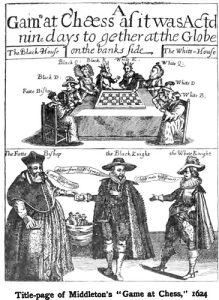
Among other prominent people featured was a former Spanish ambassador Diego Sarmiento de Acuña, conde de Gondomar, who was caricatured as the underhand Black Knight. (Apparently The King’s Men even bought up secondhand, items from his wardrobe to use in the role.) The new Spanish ambassador recognized the satire and took offence. He complained to King James.
Despite, or perhaps because of, it being a huge hit, the play was stopped after nine performances. Middleton and the actors were prosecuted. The Globe Theatre was shut down. Further performances of the play were forbidden. Middleton and the actors were fined. Middleton never wrote another play.
A few years later, the monarchy was overthrown by Cromwell and the puritans and theatrical performances were banned.
The restoration of the monarchy brought with it a liberation of theatre. Reacting to the puritanism of previous years, Restoration Comedy was deliberately rude in language and subject matter. Also, for the first time, women performed on stage and a large number of plays incorporated plots in which a woman disguised herself as a man, thus allowing audiences to see women’s legs in trousers which would normally be hidden behind skirts. If this wasn’t scandalous enough, one playwright decided to push what ould be shown on stage to the limit.
The Country Wife

William Wycherley’s The Country Wife was said at the time to be the bawdiest, most sexually explicit play ever written. It was deliberately shocking with its plot about cuckolding and randy upper class women. Not to mention its sexual innuendoes. People of the time couldn’t talk about china- the crockery not the country- without embarrassment for some time after.
It went down well in 1675, but times and tastes change. Not only did people become more conservative, governments were unhappy about playwrights satirising the country’s rulers. So in 1737, Prime Minister Robert Walpole introduced a Licensing Act whereby all plays had to be approved by the Lord Chamberlain before being performed. However the Lord Chamberlain was not only concerned with satire in plays, he was protective about many other aspects that might affront public decency. In the new climate, The Country Wife was regarded as obscene and after 1753 it was not performed on stage again until 1924.
As time went on, the Licensing Act ensured that references to drugs, sexual activity especially homosexuality, naked bodies, innuendoes and much more from what some called ‘real life’ were forbidden on stage. Inevitably there was rebellion and at the end of the 19th century a leading writer of the day mounted a challenge.
Mrs Warren’s Profession
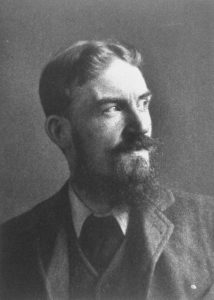
George Bernard Shaw had already had box office success with Arms And The Man. In 1893, wrote Mrs Warren’s Profession. The problem was the play was about prostitution. The Lord Chamberlain refused to allow it to be performed. In 1902, a number of leading actors performed the play in a members only club but it took until 1925, by which time Shaw had had a string of successes including Pygmalion, Man And Superman, Saint Joan and Caesar And Cleopatra, before it was finally allowed into a British theatre open to the general public.
The Licensing Act remained in place until 1968. By then, it was in disrepute and was replaced by the Theatres Act which effectively abolished censorship in the theatre, albeit allowing for the Attorney General to prosecute a play liable to ‘deprave and corrupt’. It may say something about the changing place of theatre in society that while theatre now had freedom of expression, cinemas and television were still subject to censorship, suggesting that theatre was no longer the popular entertainment of years ago and that the educated middle classes who attend theatre could be trusted not be corrupted by it.
The day after the abolition of the Licensing Act, the musical Hair received its first performance on a British stage complete with nudity and references to drug taking. Calcutta quickly followed and, over the next few years, there was an explosion of plays depicting the realities of life including all kinds of sexuality. Nudity became almost commonplace. It began to seem like the stage had become a place where anything goes. But a play at the National Theatre showed that theatre could still shock and there were still potential boundaries.
The Romans In Britain
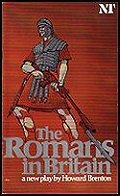
In 1980, the National Theatre presented Howard Brenton‘s The Romans in Britain, an allegory about the British army in Ireland. It featured a scene in which a naked male Roman soldier raped a naked male British Druid. I don’t think I need to say that this was simulated but the first night audience was reported to be stunned into silence at the end. When morality campaigner Mary Whitehouse heard about it, even though she hadn’t seen it, she had no doubt it should be banned.
Having failed to get the Attorney General to agree to a prosecution, she invoked a piece of legislation never intended to apply to theatre- the Sexual Offences Act – and took out a private prosecution against the director Michael Bogdanov, effectively labelling him a ‘pimp’. The chief witness for the prosecution, claimed to have seen a penis. Under cross-examination he revealed that he had been sitting at the very back of the theatre- in row X. Defence counsel Jeremy Hutchinson QC demonstrated that what he had witnessed was the actor’s thumb protruding from his fist. The prosecution dropped its case.
The case settled in law that sex and violence in theatre is ‘pretend’, not ‘real’. A triumph only tempered by the judge agreeing with Mrs Whitehouse that a prosecution under the Sexual Offences Act was valid, even if in this case unsuccessful.
In fact, nudity and sexual activity of all kinds have continued to be presented in plays unchallenged in the decades since. But that doesn’t mean there haven’t been more plays that have shocked people and rocked theatres. At the beginning of the 21st century, a small theatre in Birmingham triggered an explosion that continues to ripple through British theatre to this day.
Behtzi
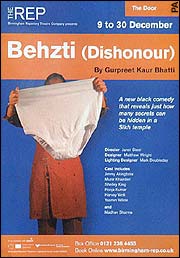
In December 2004, the Birmingham Repertory Theatre presented a new play by the British Sikh playwright Gurpreet Kaur Bhatti. Her play Behzti was described by Helen Cross in The Independent as ‘offensive, and furious and bloodthirsty and angry in all the right places. Set mainly in the Gurdwara, the Sikh place of worship, this searing comedy features rape, abuse, murder, violence – while still managing to be hugely funny, touching and tremendously important’.
It was the setting that caused the controversy. Word got round about its content and on the opening night there was a protest organised by local Sikh leaders. Leaders of the protest said they didn’t want actually to stop the play being performed so long as the setting- the Sikh temple- was changed.
About a thousand Sikhs turned up to what was intended to be a peaceful protest. Some entered the theatre and tried to get on the stage. After 20 minutes, the performance was abandoned. There were violent clashes between some protesters and the police. The playwright received death threats. Fearing for the safety of audiences and staff, the theatre cancelled further performances of the play.
The following year, a number of Christians protested against the tour of the West End hit Jerry Springer The Opera because of its irreverent depiction of Jesus and others from the Bible. The threat of picketing by a group called Christian Voice was enough to cause a number of theatres to withdraw from the tour.
So, today shocking plays like A Game At Chess, The Country Wife, Mrs Warren’s Profession and The Romans In Britain can be performed British theatres without censorship by the authorities or by the law. However, as Behtzi shows, in these days of people power, if a play shocks members of the public, whether or not they’ve seen it or even if they never go the theatre, they can protest against it and can potentially shut it down. And while the protests against that play and Jerry Springer The Opera were by people whose religious beliefs were offended, plays containing sexist or racist attitudes and behaviour, particularly in plays from the past, are also potential targets.
I’ve a feeling British theatre is in for a few more shocks yet.
Melissa D. Aaron, Global Economics: A History of the Theatre Business, the Chamberlain’s/King’s Men, and Their Plays, 1599–1642, Newark, DE, University of Delaware Press, 2003
“The Oxford Middleton Project” Thomas Middleton. The English Department at Florida State University
https://www.theguardian.com/stage/2005/oct/28/theatre
https://www.theguardian.com/stage/2006/jan/28/theatre.stage
Cross, Helen (21 December 2004). The Independent. “Behzti, Birmingham Repertory Theatre Gripping and essential: an offensive yet searing comedy”
Tale of rape at the temple sparks riot at theatre Tania Branigan, The Guardian, 20 December 2004
